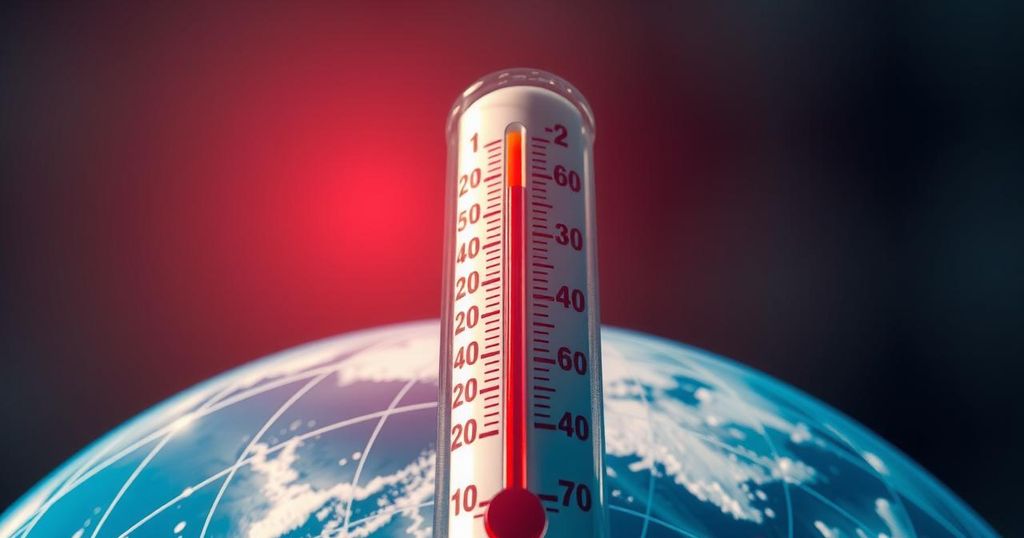2024 Sees Global Temperatures Exceed Critical 1.5°C Mark

In 2024, global temperatures surpassed 1.5°C above pre-industrial levels for the first time. Significant extreme weather events included flooding in Pakistan, droughts in the Amazon, and heatwaves in Europe. The year marked a critical milestone in climate change, driven partly by strong El Niño effects, while emphasizing the need for urgent action on greenhouse gas emissions and climate adaptation measures.
In 2024, global temperatures reached an unprecedented average, exceeding 1.5 degrees Celsius above pre-industrial levels for the first time, as confirmed by the EU’s Copernicus Climate Change Service. This milestone occurred in a year marked by extreme weather events, including catastrophic flooding in Pakistan and Afghanistan, a severe drought affecting the Amazon, and dangerously high temperatures in Europe forcing the temporary closure of the Acropolis. Notably, eleven months of the year surpassed the critical temperature threshold, highlighting a worrying trend of increasing global heat.
Natural phenomena, particularly a strong El Niño, played a significant role in exacerbating temperature rises. While the record increase for 2024 is alarming, it is essential to note that yearly temperature spikes do not automatically signify a crossing of the long-term climate thresholds set forth in international agreements such as the Paris Agreement. These agreements aim to limit global warming to an average of 1.5 degrees over extended periods. Thus, while 2024 may be notable for exceeding this milestone, the long-term average temperature remains around 1.3 degrees Celsius, indicating that sustained efforts are required to mitigate climate change effectively.
The extreme weather patterns witnessed in 2024, including severe heatwaves in Europe and destructive flooding in parts of Spain, underscore the potential for heightened climate-related risks, particularly in vulnerable regions. These events can lead to significant health impacts and economic strains, particularly in low-income countries. Furthermore, the increase in atmospheric moisture content, approximately 5% above recent averages, renders rainfall events potentially more intense, exacerbating flooding and other related disasters.
Moving forward, it is imperative to reduce greenhouse gas emissions rapidly and to adapt our infrastructures to withstand these new climatic extremes. While the cooling conditions in the tropical Pacific raise the question of whether 2025 will mirror the record heat of 2024, this year’s findings should serve as a critical warning regarding the influence of human activity on our climate and the urgent need for collective action to combat the adverse effects of ongoing climate change.
The significance of exceeding 1.5 degrees Celsius in 2024 lies within the context of international climate agreements, specifically the Paris Agreement established in 2015. With 195 nations committed to limiting warming to below this threshold, the record temperature raises concerns about long-term climate stability and potential irreversible impacts on the planet. Natural climate phenomena such as El Niño can temporarily influence temperature fluctuations, but human-induced climate change primarily drives the enduring rise in global temperatures. Understanding the implications of these weather patterns is vital, as catastrophic scenarios become increasingly likely with each small increment of warming.
In conclusion, the record temperatures of 2024 represent a critical moment in the ongoing climate crisis, highlighting the urgent need for coordinated global action to address rising emissions and enhance resilience to climate-related impacts. As nations grapple with the repercussions of extreme weather events, the call to adhere to the objectives of the Paris Agreement becomes all the more pressing. Ultimately, it is crucial for policymakers to prioritize sustainable practices and climate adaptation strategies to safeguard future generations against the increasingly severe effects of global warming.
Original Source: theprint.in






